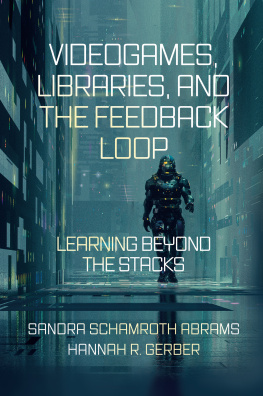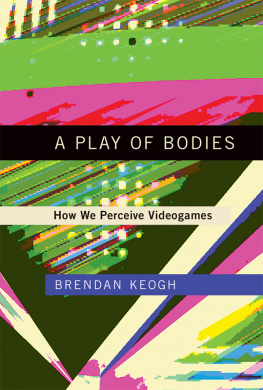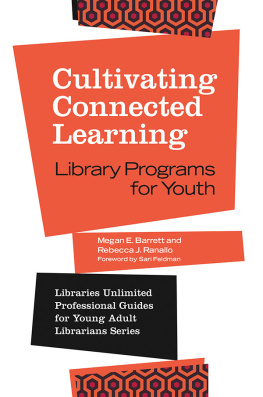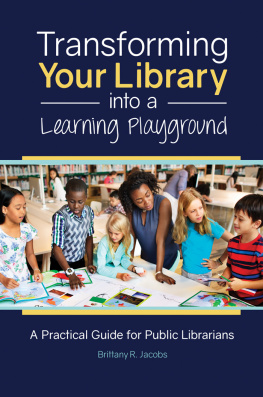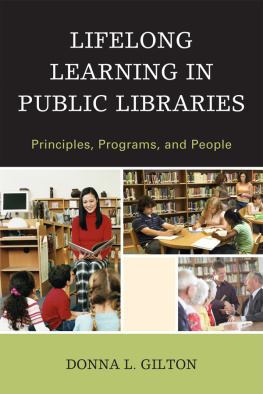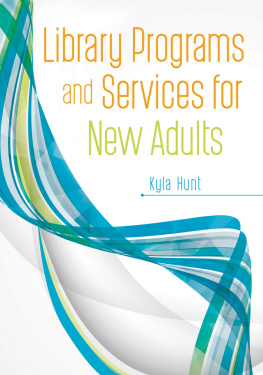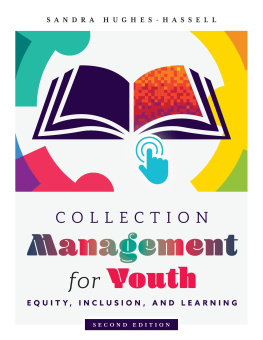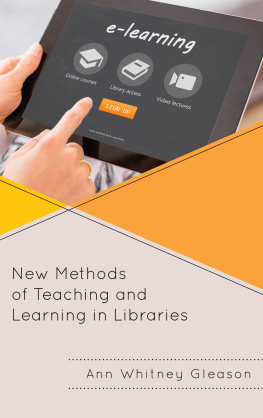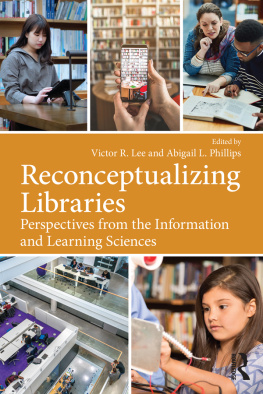Videogames, Libraries, and the Feedback Loop
Praise for Videogames, Libraries, and the Feedback Loop
Abrams and Gerber masterfully illustrate it is no longer a question of whether gaming-driven learning practices should be included in literacy learning spaces such as libraries, but rather whats taking us so long to provide these opportunities to all youth. The Feedback Loop Framework and the multi-iterative ways learners evaluate and reflect on their own learning experiences has tremendous implications not only for the fields of gaming and libraries, but also the very ways we consider youth meaning making in traditional learning spaces. The youth will show us the way, they always do; we just need to be prepared to trust and follow. Abrams and Gerber show us how.
Shelbie Witte, Ph.D., Kim and Chuck Watson Endowed Chair in Education,
Oklahoma State University, USA, author of Text to Epitext: Expanding
Students Comprehension, Engagement, and Media Literacy
Videogames, Libraries, and the Feedback Loop, by Sandra Schamroth Abrams and Hannah Gerber, is an extremely useful and revelatory read that describes how libraries and librarians can foster learning and discovery through videogame play. Its useful in the sense that librarians and, actually, educators, in general, can take lessons learned from the authors examination of what sorts of learning and meaning making come from the use of videogames in supported learning spaces. Central to how the learning is examined is this concept of the feedback loopa set of real-time indicators and signifiers that players interact with that helps them understand their place in a game and make strategic decisions on how to proceed. Chapter 2, which covers the feedback loop is crucial reading for anyone designing learning spaces that focus on iterative and interest-driven experiences (aka the I2 approach covered in Chapter 5). Indeed, the book and the feedback loop lens are a revelation for me (an instructional game designer turned professor) as I think about engaging course design and my role as a co-learner/explorer with my students in a higher education environment that was forced to shift to online instruction! This detailed account of how learners engage with videogames with collaborative support is very timely and I cannot recommend this book enough.
Mark Danger Chen, Ph.D., Lecturer, Interactive Media Design,
University of Washington Bothell, USA, author of Leet Noobs: The
Life and Death of an Expert Player Group in World of Warcraft.
Drs. Sandra Abrams and Hannah Gerber provided a detailed look at implementing videogames programming in libraries. Drs. Abrams and Gerber bring extensive experience in research on videogames and youth. This book offers insights to both researchers and practitioners for how to implement a videogame program but also what those programs can provide to youth who are participating, beyond just playing a videogame. The framework of a feedback loop that Drs. Abrams and Gerber present, although a well-known concept within videogames, provides those offering videogame programming in libraries a much needed way to assess their programs and determine success. Whether you are offering your first videogame program or you are a seasoned pro, this book offers new insights for everyone.
Crystle Martin, Ph.D., Director of Library and Learning Resources, El
Camino College, California, USA, author of Voyage across a Constellation of
Information: Information Literacy in Interest-Driven Learning Communities.
Videogames, Libraries, and the Feedback Loop: Learning Beyond the Stacks
By
Sandra Schamroth Abrams
St. Johns University, USA
and
Hannah R. Gerber
Sam Houston State University, USA and University of South Africa, South Africa

United Kingdom North America Japan India Malaysia China
Emerald Publishing Limited
Howard House, Wagon Lane, Bingley BD16 1WA, UK
First edition 2021
Copyright 2021 Sandra Schamroth Abrams, Hannah R. Gerber.Published under exclusive license by Emerald Publishing Limited.
Reprints and permissions service
Contact: permissions@emeraldinsight.com
No part of this book may be reproduced, stored in a retrieval system, transmitted in any form or by any means electronic, mechanical, photocopying, recording or otherwise without either the prior written permission of the publisher or a licence permitting restricted copying issued in the UK by The Copyright Licensing Agency and in the USA by The Copyright Clearance Center. Any opinions expressed in the chapters are those of the authors. Whilst Emerald makes every effort to ensure the quality and accuracy of its content, Emerald makes no representation implied or otherwise, as to the chapters suitability and application and disclaims any warranties, express or implied, to their use.
British Library Cataloguing in Publication Data
A catalogue record for this book is available from the British Library
ISBN: 978-1-80071-506-6 (Print)
ISBN: 978-1-80071-505-9 (Online)
ISBN: 978-1-80071-507-3 (Epub)

To my family, who help me explore limitless learning Sandra
To my nephews, who show me that life is an ever-expanding universe of play Hannah
Contents
List of Tables and Figures
Table
Table 3.1. | Features and Offerings Across the Library Sites. |
Figures
Figure 2.1. | The Feedback Loop Components. |
Figure 2.2. | The Elder Scrolls V: Skyrim Objectives in its Taking Care of Business Side Quest. |
Figure 2.3. | An Example of Progress Bars in Band Hero. |
Figure 2.4. | An Example of Candy Crush Progress Bar Alerts Related to the Objective. |
Figure 2.5. | An Example of a Countdown Timer as a Progress Bar in Super Mario Bros. |
Figure 2.6. | Avatar Creation Options in The Elder Scrolls IV: Oblivion. |
Figure 2.7. | An Example of the Time Function in The Elder Scrolls IV: Oblivion. |
Figure 2.8. | An Example of a Players Damage Status in Super Smash Bros. Brawl. |
Figure 2.9. | An Example of a Game Objective in Candy Crush. |
Figure 2.10. | An Example of Objective Options After an Unsuccessful Run in Candy Crush. |
Figure 2.11. | An Example of an In-game Map in Battlefield. |
Figure 2.12. | An Example of an In-game Map in Forza Motorsport. |
Figure 2.13. | An Example of In-game Maps in (a) Four-Player Mode and (b) Two-Player Mode in Call of Duty. |
Figure 2.14. | An Example of a Leaderboard from League of Legends. |
|

